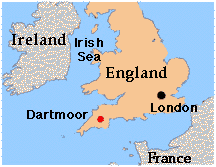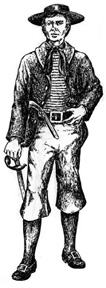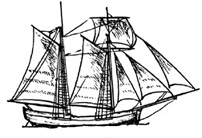A Privateersman's
Letters Home from Prison
by Bruce Felknor
Capt. George Duffy's POW Page brings
us outstanding accounts of many of our fellow WW II veterans who were prisoners
of war. Now the courtesy of an editor at Naval Institute Press enables me
to share with you the remarkable letters from prison of a Yankee privateersman
captured in the War of 1812. The editor is Kimberley A. VanDerveer, the production
editor on my book "The U.S. Merchant Marine at War, 1775-1945."
She is a direct descendant of the author of the letters, Perez Drinkwater
of North Yarmouth, Maine. His letters were first published in the Machias
[Maine] Union on May 3, 1881, when the War of 1812 was as recent as World
War II is to us.
Perez Drinkwater was lieutenant
of the privateer schooner "Lucy" when he was captured by
the British Navy brig "Billerikin" in the last days of 1813.
He was landed, with the rest of his crew, in the southwest of England, as
he wrote to his brother Elbridge Drinkwater at home. It is obvious
that he wrote repeatedly, but neither his earlier letters nor answers to them
ever got through. In the first letter, five months into his incarceration,
it is obvious that the experience had done nothing to sweeten his disposition
toward his captors.
[In the letters below, I have added
paragraphing, but left other punctuation and spelling untouched.]
 DARTMOOR
PRISON Saturday Morning, May 20th, 1814
DARTMOOR
PRISON Saturday Morning, May 20th, 1814
Dr. Brother -
. . .We arrived into Plymouth
on the 20th of Janurary was put on board the [prison-ship] Brave on the
24th and was landed from her on the 31 and marched to this place in a snow
storm. This Prison is situated on one of the highest places in England and
it either snows or rains the whole year round and is cold enough to wear
a great coat the whole time there is 10,000 of us here now but the French
are about going home. . .
This is the first time that I
was ever deprived of my Liberty and when I sit and think of it it almost
deprives me of my sences for we have nothing else to do but sit and reflect
on our preasant situation which is bad anough god noes for we have but 1
lb and a half of black bread and about 3 ounces of beef and a Little beef
tee to drink and all that makes us one meal a Day the rest of the time we
have to fast which is hard times for the days are very Long heir now I want
to get out of heir before the war is over so that I can have the pleasure
of killing one Englishman and drinking his blood which I think I could do
with a good will for I think them the worst of all the human race for their
is no crimes but what they are gilty of. . . .
 . . . yisterday
they called up 500 French men to go away their was one that had been in
prison Nine years and had worn his blanket out so that he had but half of
it to give those rebels and on that acount they sent him back and put him
on the bottom of the books for exchangeing, the man took it so hard that
he cut his throught and was found dead between the prison dores, and a thousand
other such deeds they have been guilty of since we have been confined heir
in this cursed place and a monght these rebels for I can call them nothing
better and I shall never dye happy till I have had the pleasure of killing
one of them which I am determined to do if an oppertunity ever offers to
me to doe it. . . .
. . . yisterday
they called up 500 French men to go away their was one that had been in
prison Nine years and had worn his blanket out so that he had but half of
it to give those rebels and on that acount they sent him back and put him
on the bottom of the books for exchangeing, the man took it so hard that
he cut his throught and was found dead between the prison dores, and a thousand
other such deeds they have been guilty of since we have been confined heir
in this cursed place and a monght these rebels for I can call them nothing
better and I shall never dye happy till I have had the pleasure of killing
one of them which I am determined to do if an oppertunity ever offers to
me to doe it. . . .
. . .we have plenty of creepers
[insects such as bedbugs and lice] heir to turn us out in the morning, them
and the Englishmen together don't Let us have much peace Day nor night for
they are both enimyes to us and Likewise to peace and the more they can
torment the human rase the better they are pleased. . . .
I hope that you will write to
me every oppertunity that affored you to do for it would be a happy thing
for me to heir from you I have wrote several Letters to you be fore and
shall still continue to write every oppertunity, you must tell Sally to
bare her misfortunes with as much fortitude as she can till my return I
must conclude with wishing you all well. So god bless you all and be with
you for I cannot.
From your sincere friend &
Brother.
PEREZ DRINKWATER
A well-dressed privateersman
shown at right
Perez's letter to his wife (below) appears to be the only one that got through
-- though he kept trying -- despite the ever-present "creepers," which
-- small wonder -- were getting on his nerves.
ROYAL PRISON, Dartmore Oct.
12th 1814
Dear Sally -
It is with regret that I have
to inform you of my unhappy situation that is, confined heir in a loathsom
prison where I have wourn out almost 9 months of my Days; and god knows
how long it will be before I shall get my Liberty again. . . . I cheer my
drooping spirits by thinking of the happy Day when we shall have the pleasure
of seeing you and my friends. . .
This same place is one of the
most retched in this habbited world. . . neither wind nor water tight, it
is situated on the top of a high hill and is so high that it either rains,
hails or snows almost the year round for further partickulars of my preasant
unhappy situation, of my strong house, and my creeping friends which are
without number. . . .
. . .my best wishes are that
when these few lines come to you they will find you, the little Girl [his
daughter] my parents Brothers sisters all in good helth I have wrote you
a number of letters since my inprisenment here and I shall still trouble
you with them every oppertunity that affords me till I have the pleasure
of receiving one from you which I hope will be soon. . . .
I am compeled to smugle this
out of prison for they will not allow us to write to our friends if they
can help it. . . . So I must conclude with telling you that I am not alone
for there is almost 5,000 of us heir, and creepers a 1000 to one. . .
Give my Brothers my advice that
is to beware of coming to this retched place for no tongue can tell what
the sufferings are heir till they have a trial of it. So I must conclude
with wishing you all well so God bless you all. This is from your even [ever]
derr and beloved Husband.
PEREZ DRINKWATER, Jun.

A schooner
The Treaty of Ghent ended the war in December 1814, but Perez Drinkwater and
several thousand other Americans languished in prison month after month. The
following April he was still there when the wanton and brutal massacre (which
he spells variously) of American prisoners was ordered by a drunken British
officer.
One survivor said the prisoners
were wont to play ball in the prison yard. When a random ball would sail over
the wall, the sentry would toss it back, but one day he refused. Several prisoners
threatened to dig under the wall to retrieve it, and when he refused they
started digging.
When the prison commander discovered
this, he ordered all prisoners into the compound, where he had stationed squads
of soldiers at eight different points, and now ordered them to fire. Perez
writes below that only seven men were killed and thirty-eight wounded. Other
accounts put the toll as high as hundreds of men, mostly American
seamen. Perez may have been citing only what he saw in his section. One tradition
has it that most of the soldiers deliberately fired in the air. If so, it
could explain a low death toll. However, two days after the massacre, and
the very day before his release, Perez Drinkwater wrote to his father and
mother with news of his impending freedom, and with a chilling postscript
on the massacre.
A.D. 1815 DARTMOOR PRISON
Ap. 8th
Honored Parents
I have the pleasure to inform you that I am in good helth and my best wishes
are that when these few lines Come to hand they may find you the same and
all my frinds. Dowtless you have heird of the marcichre [massacre] of Dartmoor
in which ther was 7 killed and 38 wounded, it was done on the 6th of this
month, the soldiers fired on us when we were all in the yard about 5000
they fired on us in all directions and after we was [back] in the prison
they killed a number in the prison.
It was one of the most retched
things that ever took place Amonghts the savages much more amonghts peple
that are the bullworks of our religion. I had the good fortin [fortune]
to escape their fury, but they killed some while begging for mercy after
being wounded they likewise kicked and mangle the dead right before our
faces. Pain Perry of North Yarmouth was one that was wounded but not bad.
. . .
I shall leave heir to morrow
morning for London and from their to Crownstad and from their to Portland
in the brig Albert of Portland I think it will be much more to my
advantage than to return home in a corveat [corvette] as it will be some
time before it comes to my turn. . . .
There is a number of men here
that belong to Yarmouth, falmouth, freeport and Pownal that will inform
you of the Late mascree [massacre] at this place . . . one of our Crew was
killed in the Late Marseehree [massacre] his name was James Man two has
died besid John Strout belonging to Portland tomorrow will be a happy day
if I live to see it as I shall get my liberty Please to remember me to my
friends & to my Wife I hope that you [will] assist her till my return
which I hope will be in 4 months.
I remain your obedient son,
PEREZ DRINKWATER
As to the massacre and the tradition that many of the riflemen deliberately
missed, it should be noted that in that era British troops, and warships as
well, placed little emphasis on aimed fire and great stress on rapid fire. The
quality of mercy implied in the tradition was scarcely evident in the brutality
that Perez reported to his parents. Prison has often been observed to brutalize
jailers as well as prisoners.
Perez Drinkwater eventually did return home, and took up postwar life and
activity in community affairs, and died an old man, full of age and honors.
Map adapted from Encyclopedia
Britannica.
Other illustrations from Picture
Book of the Revolution's Privateers, C. Keith Wilbur,
Harrisburg, Pennsylvania: Stackpole Books, 1973
Bruce
Felknor's Home Page
Home
Merchant Marine in War of 1812
American
Prisoners of War buried at Dartmoor Prison
6/16/01
www.USMM.org ©1998,
1999, 2000 by Bruce Felknor and. You may quote small portions of material
on this website as long as you cite American Merchant Marine at War, www.usmm.org,
as the source. You may not use more than a few paragraphs without permission.
If you see substantial portions of any page from this website on the Internet
or in published material please notify usmm.org @ comcast.net
DARTMOOR PRISON Saturday Morning, May 20th, 1814
. . . yisterday they called up 500 French men to go away their was one that had been in prison Nine years and had worn his blanket out so that he had but half of it to give those rebels and on that acount they sent him back and put him on the bottom of the books for exchangeing, the man took it so hard that he cut his throught and was found dead between the prison dores, and a thousand other such deeds they have been guilty of since we have been confined heir in this cursed place and a monght these rebels for I can call them nothing better and I shall never dye happy till I have had the pleasure of killing one of them which I am determined to do if an oppertunity ever offers to me to doe it. . . .
